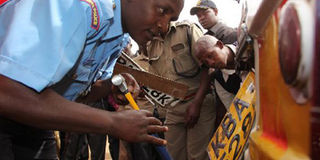Wrangles frustrate revamp of number plates

A policeman removes a number plate from a matatu at Tagore stage in Eldoret town on April 7, 2014 during a crackdown led by the National Transport and Safety Authority and Traffic Police. Kamiti Prison had procured two machines from Germany expecting to produce updated number plates at a rate of 200 an hour, but it fell through. PHOTO | JARED NYATAYA | NATION MEDIA GROUP
What you need to know:
- Such attempts, first considered in 2007, have dragged on in court, effectively holding the authorities to ransom and giving a lifeline to the lucrative forgery business.
- NTSA Director-General Francis Meja said it remained unclear as when the matter would be settled, hence the continued use of the number plates made by the Prisons Department.
Tender and procurement disputes have hampered attempts to overhaul the current system of making motor number plates, which are easy to counterfeit.
Such attempts, first considered in 2007, have dragged on in court, effectively holding the authorities to ransom and giving a lifeline to the lucrative forgery business.
The National Transport and Safety Authority (NTSA), which is now tasked with registering new vehicles, has been waiting for a court case on a tender award for the introduction of the new number plates to change from the current easy-to-duplicate ones.
The current second-generation number plates were adopted in 1989, replacing the system that had been there since 1938.
NTSA Director-General Francis Meja said it remained unclear as when the matter would be settled, hence the continued use of the number plates made by the Prisons Department.
“The current number plates are so easy to duplicate and the technology is quite outdated. Unfortunately, it has become a trend that every bidder who loses does not accept and we are held to ransom through these cases,” Mr Meja said.
Former Transport Cabinet Secretary Michael Kamau unveiled samples of the new number plates in February 2014.
The number plates, which were to be fitted with a microchip that holds the personal information details of the car owner, had been expected to help curb crimes such as kidnappings, carjackings and motor vehicle thefts.
The NTSA boss said the new plates would be accompanied with another irremovable microchip with a similar data and placed on the vehicle windscreen, making it difficult to change as one would have to destroy the whole windscreen.
Kamiti Prison had even procured two machines from Germany, expecting to produce updated number plates at a rate of 200 an hour, but this was not to be.
Wrangles erupted when it emerged that some crooked government officials had awarded tenders for the supply of new-generation number plates at nearly three times the value of the bids initially tabled.
The officials also tampered with bid documents submitted by rivals, in one case adjusting the price of equipment and services by 3,584 times, in a bid to knock out competition and engineer the award of tenders to favoured companies.
The Public Procurement Administrative Review Board discovered the rot in October 2015, during investigations into award of tenders worth nearly Sh3 billion for the production of the new generation vehicle number plates.
The revelations have put officers at the Kenya Prisons Services Enterprises, who handled the bid, in the spotlight for what appears to be a case of tender rigging. However, nothing has been done to discipline those involved.





